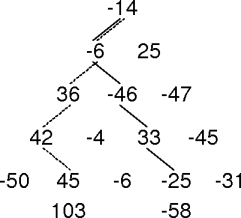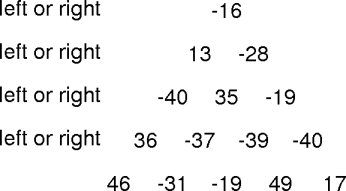
$ du -sh * 170K dj_Mitzura_-_If_you_really_want_to_rock_the_funky_beats.jpg 140M dj_Mitzura_-_If_you_really_want_to_rock_the_funky_beats.mp3 74M djspooky_ghostworldmix.m4a 8.0K djspooky_ghostworldmix.txt 245M fast-flux.mp3 2.0K fast-flux.txt 109M Green_Cheese_-_Green_Cheese_Vol_39_Reality_Adjustment.mp3 4.0K Green_Cheese_-_Green_Cheese_Vol_39_Reality_Adjustment.txt 333M Kper_-_Attention_Deficit_Disorder.mp3 6.0K Kper_-_Attention_Deficit_Disorder.txt 336K Tea_Time_at_Brian_Enos_House.jpg 110M Tea_Time_at_Brian_Enos_House.mp3 4.0K Tea_Time_at_Brian_Enos_House.txt $ du -h 1.0G . $
files packed sum 0 = 0 351 = 351 350 = 350 350 = 350 351 350 = 701 351 350 = 701 350 350 = 700 351 350 350 = 1051
answer solve(p)
candidates = generate-all-candidates(p)
for each candidate in candidates
if solution(p, candidate)
return candidate
return none
files file-pack(files)
candidates = possible-packings(file)
max = 0
solution = nil
for each c in candidates
if c.size < 700 and c.size > max
solution = c
max = c.size
return solution
n 2n GHz-1 20 106 30 109 1 sec. 40 1012 16 min. 50 1015 11 days

max-sum-path(triangle)
all-paths = all-paths(triangle)
max-path = pick(all-paths)
max-sum = path-sum(triangle, max-path)
for each path in all-paths
sum = path-sum(triangle, path)
if sum > max-sum
max-sum = sum
max-path = path
return [ max-sum, max-path ]

sort(a[])
candidates = generate-all-candidates(a)
for each candidate in candidates
if sorted(candidate)
return candidate
return none
|
|
|
route file-route(cities)
candidates = possible-routes(cities)
solution = pick c in candidates
min = c.size
for each c in candidates
if c.size < min
solution = c
min = c.size
return solution
|
|
|
answer solve(p)
candidates = generate-all-candidates(p)
for each candidate in candidates
if solution(p, candidate)
return candidate
return none
answer solve(p)
candidates = generate-all-candidates(p)
best = pick a candidate
for each candidate in candidates
if candidate is better than best
best = candidate
return best
generate(problem)
candidates = { }
n = problem.size()
for i = 0 to 2n - 1
candidates.add(select(i, problem))
return candidates
select() makes subsets based on i's 1 bits.
generate(problem)
candidates = { }
p = first-permutation(problem)
do candidates.add(p)
p = next-permutation(p)
while p ≠ first-permutation(problem)
return candidates
answer solve(p)
candidates = generate-all-candidates(p)
for each candidate in candidates
if solution(p, candidate)
return candidate
return none
generate all the candidates,
store them, and
evaluate them one by one.
answer solve(p)
solution = first-candidate()
while candidates-left()
candidate = next-candidate()
if candidate better than solution
solution = candidate
return solution
Constant O(1) Log O(log n) Linear O(n) Log-linear O(n log n) Polynomial O(ni) Exponential O(2n) Factorial O(n!)